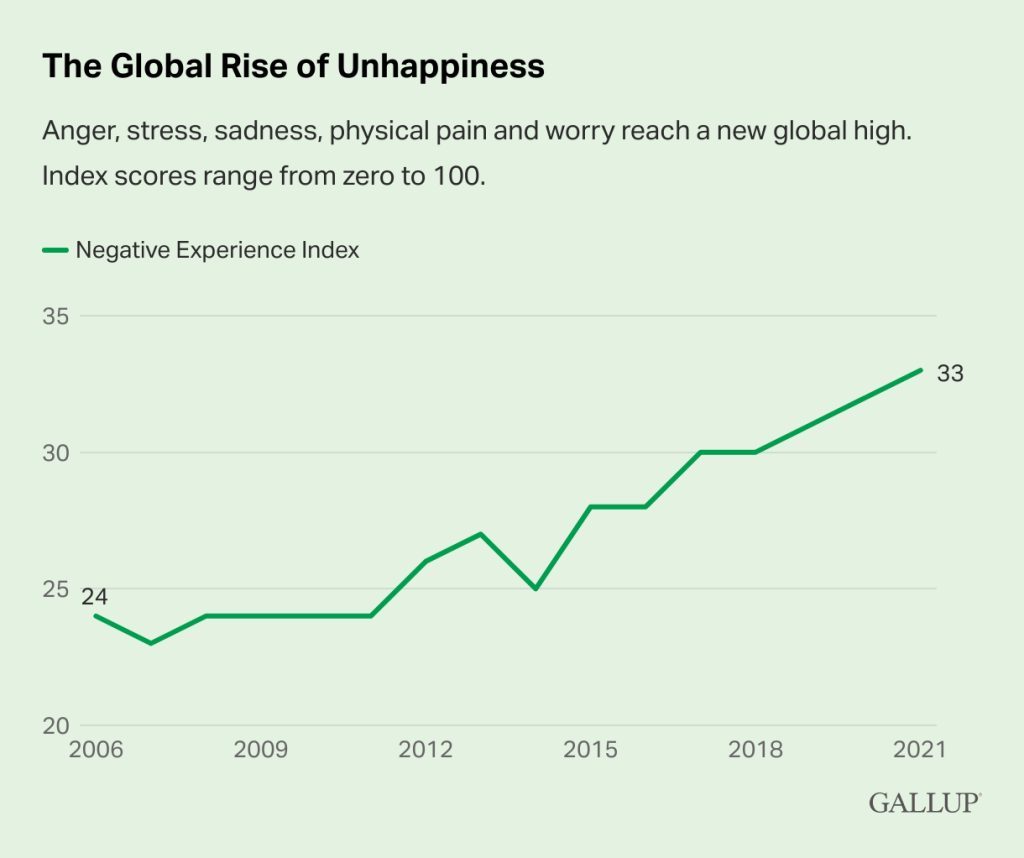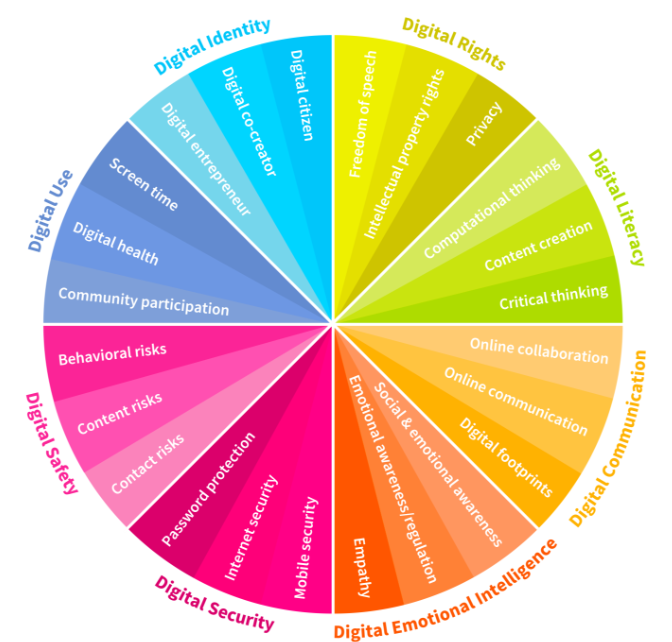In many ways, our lives are better than ever before. In this increasingly digital world, we are all constantly connected and have all the information we could want at our fingertips. This trend is not expected to stop at all: Artificial Intelligence (AI) will soon enter all aspects of our lives, to make them better, smarter, more efficient, and ever connected.

At the same time, the world is experiencing a mental health crisis, and global unhappiness is currently at a record high (Figure 1). People suffer more and more from feelings of anger, sadness, pain, worry, and stress than ever before, and the media is even speaking of a loneliness epidemic. This raises the question: are people mentally equipped to deal with digital advancements?
Experts disagree on whether digitalization can be blamed for the increased overall unhappiness. Most agree that technology is a double-edged sword and can have both positive and negative effects on our mental well-being. Some of the detrimental effects of digital appliances include people’s trouble sleeping, concentrating, and memorizing and youth’s feelings of depression and anxiety. If this unhappiness trend were to continue – and currently we have no reason to believe that it won’t – this paints a disheartening picture for the future.
If we already struggle to stay sane in this digital world now, how can we possibly equip our children to lead happy, fulfilling lives? The harsh truth is: we can’t. However, we can actively educate our children and equip them with some of the skills that will protect their mental well-being while immersed in technology. And this should be done as early as primary school. In this article, we argue the Dutch primary education system should be reshaped to teach our children the critical skills needed to survive, and hopefully thrive, in their digital world. Even while we are no experts at this ourselves.
Ban smartphones in class
The ban on smartphones is a controversial one. Many will say that the development of AI and the way it is now entwined into our society will not allow for this ban. Common arguments are the ease of communication, easy access to information, or supplementary learning material. However, schools in France and Australia show an increased amount of concentration in class among students, and a decrease in the prevalence of cyberbullying. In our opinion, the merits of having smartphones in class do not outweigh the disadvantages.
“Internet businesses are organized around dopamine-dosing tools designed to hook the public.”
Mindfulness and emotional regulation
“Dopamine-dosing tools designed to hook the public”, is what smartphones have been made to be. Digital addiction is an epidemic. Children are spending up to seven hours a day in front of a screen. To mitigate the risk of digital addiction in young children, a mindful, technology-free start of the day can serve as a dopamine detox for kids’ brains. Some religious schools already carry this out by having prayers before starting class. This can also be seen as a form of mindfulness or meditation.
Children have a decreased sense of focus. Even with the absence of smartphones in class, children could still experience the negative consequences of their use outside of school. To exercise their ability to focus, breathing techniques could be used in class. For example, by focusing on breathwork for 10 minutes, kids’ brains learn to focus on one thing and not constantly multitask.
Mental resilience is being able to adapt to life’s misfortunes and setbacks. Due to digitalization, mental resilience among the youth is decreasing. Even more, the use of social media is linked to increased depression in younger populations. Findings indicate that mindfulness-based practice along with physical activity could increase individual resilience.
One research shows a decrease in emotional intelligence. Another research shows long-term utilization of Information and Communication Technology (ICT) as an emotional coping strategy may have a negative influence on mental health and/or exacerbate mental health predispositions. If phone users turn to misuse of ICTs to avoid negative experiences, the consequences are increased levels of depression and anxiety. Children need to be taught in school that turning to technology is not a sustainable option for emotional regulation. Rather than avoiding their feelings using technology and constant stimuli, children need lessons in how to tolerate, navigate and regulate negative emotions
Technological ethics and responsibility
Bullying is still prevalent and even augmented through digitalization. Cyberbullying has increased due to this digitalization. Unhappiness due to distorted body images has also increased in young adults. Lessons on digital information assessment could mitigate these trends. Group projects on the distinction of what is “real or fake” with peers can also stimulate healthy discourse among the youth.
Polarization is also more prevalent due to the ever-growing information found on the internet. Some researchers fear this polarization, distrust, and divisiveness will only grow as digitalization continues. Children need to engage in dialectic discourse such as debates, to realize their common ground. This encourages respect for differing opinions, curiosity for other solutions, and entertainment of different points of view. Although debates are not necessarily a part of primary school education, some aspects of this discourse may very well be taught in class. The polarization of society is extremely detrimental to its functioning. It is no use to teach children about the world without including how social media is shaping their worldview.
Technological competencies
The aforementioned suggestions all focus on skills and competencies that will contribute to the children’s happiness. However, we also note that there are additional technology-related skills children need to master to function in and contribute to society. Being a valuable member of society is, of course, a big contributor to someone’s happiness.
The Dutch government has declared 10 principles and objectives for primary school (article 8 WPO) and 15 content requirements (article 9 WPO). We disturbingly note that some notion of technological awareness or education is not an explicit focal point of the Dutch primary education system. The development of “social and civic competencies” is mentioned, but we argue that “technological” should be added to this list.

These technological competencies should include digital identity, digital rights, digital literacy, digital communication, digital emotional intelligence, digital security, digital safety, and digital use (Figure 2). We highlight it is not about making kids experts on all these topics, but it is essential to their well-being to lay some foundation for these skills early on.
Current practice
Lastly, physical activity and the development of creativity, curiosity, and imagination very well have a great effect on the happiness of a child. As these aspects of primary school education are very well accounted for, it does not seem that these aspects are at risk with the advancement of technology. On the contrary, technology here seems to be a new medium in which children can learn and play. This can be done through gaming with fellow peers online, expressing themselves through digital art, and interactive “learning” games for children.
Is it even possible to prepare our kids?
We obviously need to adapt, but with the fast pace of technological development, is it even possible to keep up? Should we try to change, or should we instead change technology to better fit humans? The truth is, we do not know what the future holds. If, for example, children are suddenly able to learn through downloading information via a microchip implanted in their brains, something like a smartphone ban will not be necessary at all.
It is clear that technological advancements do not simply mean more happiness. In fact, digitalization has been shown to be detrimental to several aspects of our mental health. Some of these negative effects can be mitigated by the development of specific knowledge and skills tailored to the new digital age. This can, and should, be addressed as early as primary school. Not only should there be a ban on smartphones in school; mindfulness, emotional education, technological ethics, and responsibility and discourse should be part of the primary school curriculum in order to ensure a future generation that is mentally equipped to deal with the challenges of their world.


